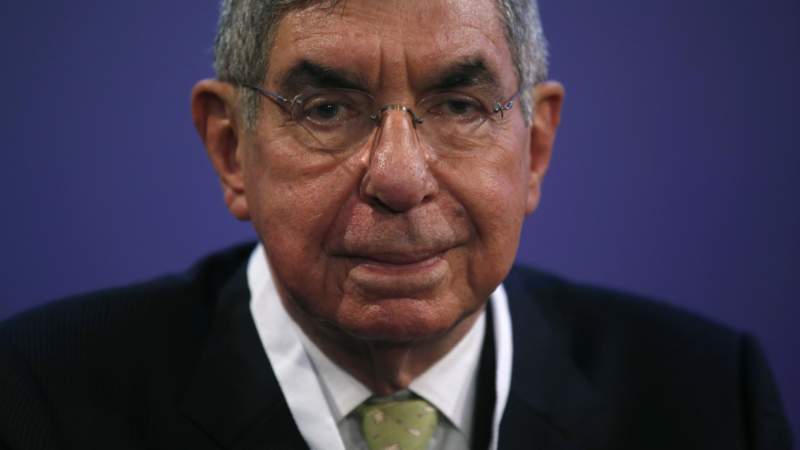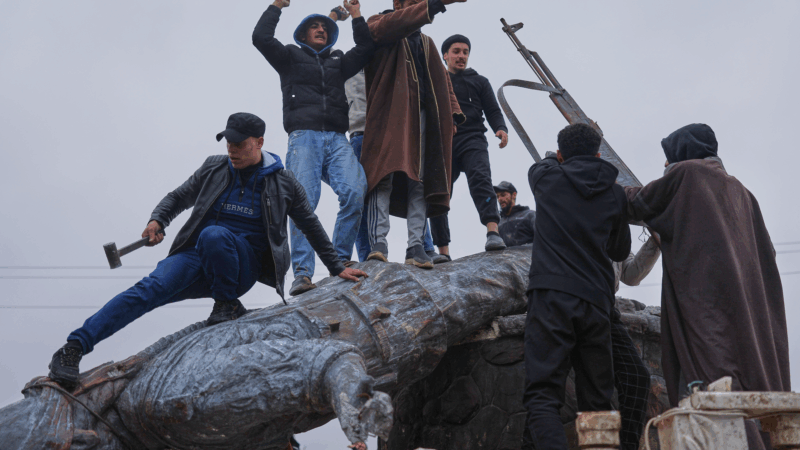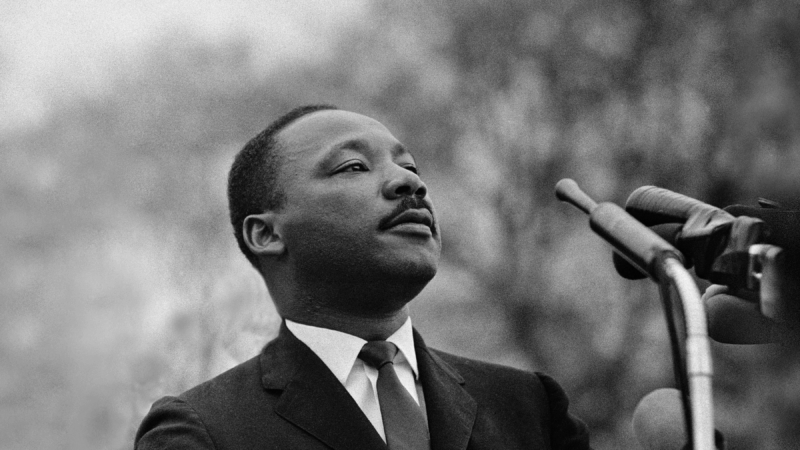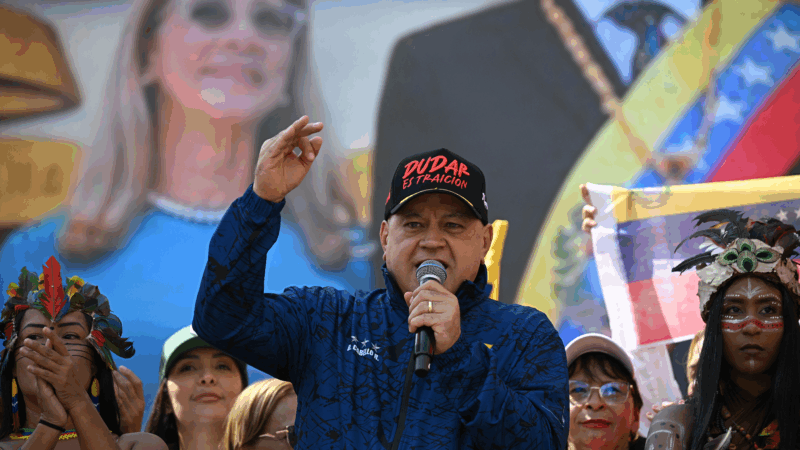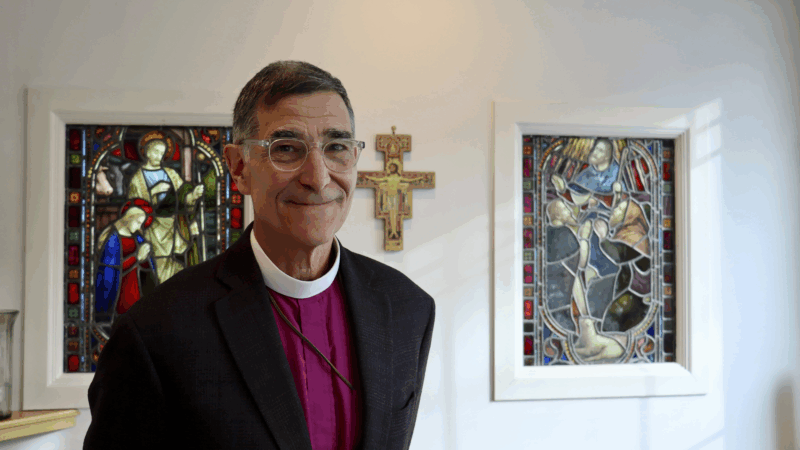Former Costa Rican president says visa may have been revoked over criticism of Trump
Former Costa Rica president Óscar Arias Sánchez – a Nobel Peace Prize winner – had his U.S. visa revoked by President Trump’s U.S. State Department this week.
Arias Sánchez, 84, said in an interview with Morning Edition that U.S. Embassy workers in Costa Rica told him his visa was revoked due to his close ties with the Chinese government. Arias Sánchez served as president of Costa Rica from 1986 to 1990 and then again from 2006 to 2010. Costa Rica formalized relations with China in 2007.
Earlier this year, the Nobel Laureate criticized President Trump on social media, comparing him to a “Roman emperor” telling the rest of the world what to do. Arias Sánchez told NPR he worries those comments influenced the decision to revoke his visa.
“The president has a personality that is not open to criticism or disagreements,” Arias Sánchez said.
A State Department spokesperson provided the following statement when NPR asked for comment about Arias Sánchez’s revoked visa: “Visa records are confidential under U.S. law; therefore, we cannot discuss the details of individual visa cases.”
Arias Sánchez spoke to NPR’s Leila Fadel about his visa cancellation, Trump and how the U.S. is treating the rest of the world.
Editor’s note: Arias Sánchez spoke through an interpreter and in English. This interview has been edited for length and clarity.
Arias Sánchez: So I received an email on Tuesday, April 1, that was a very short one that said that my B1/B2 visa had been revoked. I called the embassy to ask what had happened.
Leila Fadel: And what did they say?
Arias Sánchez: They asked me to come into the embassy. Fortunately, I live about five minutes away, so I was able to be there in person where they somewhat explained what happened.
They told me my visa was revoked because of my close ties to China. During my second administration from 2006 to 2010, I established diplomatic relations with China, and that’s because it has the second largest economy in the world. Costa Rica has a very open economy, and its growth relies on international trade. And so in 2007 is when we formally established diplomatic relations.
Fadel: How much do you think your public statements criticizing President Trump, comparing him to a Roman emperor played in them, suspending your visa?
Arias Sánchez: I don’t know. The embassy workers didn’t say that was specifically why my visa was revoked and they cited my relationship with China. But I have to imagine that my criticism of President Trump might have played a role. The president has a personality that is not open to criticism or disagreements.
Fadel: The Trump administration says it’s targeting anyone they deem as having what they define as a “hostile attitude” to the U.S. What do you make of that policy?
Arias Sánchez: I don’t have a hostile attitude towards the United States. Friends sometimes agree, sometimes disagree. And concerning U.S. policy towards Central America, supporting the Contras militarily affected my own country.
During the Reagan administration, I had a strong disagreement with his policy towards the region. But concerning my feelings towards the U.S. – you know, my two children were educated in the U.S. My son went to Harvard and my daughter went to Boston College. I received more or less 85 honorary degrees from the best universities in the U.S.
I am a good friend, but I also have fought for noble causes.
Note: Throughout the 1980s, the U.S. backed Contra rebels against the left-wing Nicaraguan government, an action Arias Sánchez opposed. As president, he did not allow the U.S.-backed Contras to operate in Costa Rica.
Fadel: I think there’s so much fascination with your case because you’re such a known figure and yet your visa was revoked. So what does that say about the policy of the U.S. today under this administration?
Arias Sánchez: Well, I don’t agree with it. For a Democrat – and I am a true Democrat – criticism is welcome. It’s the only way you can build agreements. This happened to me when I met with the five Central American presidents in August of ’87. I had introduced my peace plan in the U.S. In a negotiation, you never get what you want. You always get what you can.
And with criticism from adversaries or from the press and freedom of the press and freedom of opinion, freedom of expression is a prerequisite for any democratic government. So I have benefited myself with criticism from all those sources. And it seems to me that nowadays, one shouldn’t dare to criticize the U.S. because you could be punished.
This article was edited by Treye Green. The radio version of this story was edited by Reena Advani and produced by Julie Depenbrock.
Syrian government announces a ceasefire with the Kurdish-led Syrian Democratic Forces
Syria's new leaders, since toppling Bashar Assad in December 2024, have struggled to assert their full authority over the war-torn country.
U.S. military troops on standby for possible deployment to Minnesota
The move comes after President Trump again threatened to invoke the Insurrection Act to control ongoing protests over the immigration enforcement surge in Minneapolis.
Martin Luther King Jr. had a dream … about health care
A doctor from Nigeria tells what Martin Luther King Jr. taught him about health, Justice and inequality.
Sunday Puzzle: It takes two
Ilyse Levine-Kanji of Westborough, Massachusetts plays the puzzle with Weekend Edition Puzzlemaster Will Shortz and host Ayesha Rascoe.
Venezuela: Maduro’s enforcer Cabello still central to power
The ousting of Venezuela's president raised hopes of change — but the politician now controlling the streets shows how little has really shifted.
Amid ICE clashes, New Hampshire bishop urges clergy to prepare their wills
The Episcopal bishop of New Hampshire told priests protesting ICE to get their wills and affairs in order. Some praise the bishop, while other priests say they never signed up to be martyrs.

